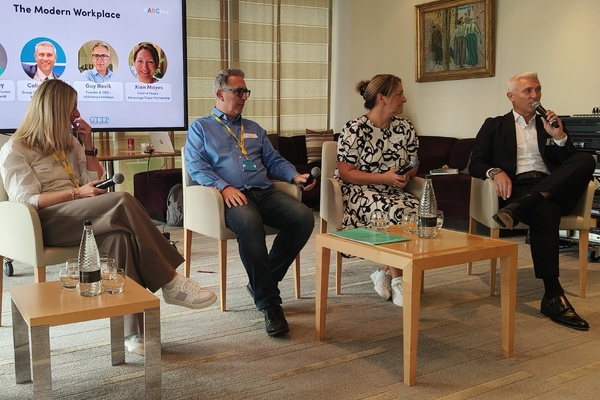The four-day week, and five other HR and employment challenges facing travel
 Sarah Dennis
Sarah DennisUnfair dismissal, flexible working, neurodiversity and the four-day week were among an assortment of topical HR and employment issues leading the agenda at an industry-led seminar this week.
C&M Recruitment’s first ABC Live event in London saw C&M managing director Barbara Kolosinska (B), Travlaw partner Ami Naru (A) and HR professional Claire Steiner (C) take to the stage to set the scene.
They were joined by a roster of industry figures to explore topics including whether businesses should insist employees return to the office, and the impact of impending changes to employment law.
Here are the key takeaways you need to think about.
Preventing sexual harassment
With a mandatory duty on employers – regardless of size – to take “reasonable” steps to prevent sexual harassment in the workplace set to take effect from 26 October, Naru urged the audience to get ahead.
“Is doing nothing an option? No,” said Naru. She commended employers who have already implemented sexual harassment policies for making "a good start", but stressed this alone was not enough.
"You’ve got to provide training and regularly roll it out," Naru continued. "But then go further so if there are issues in the workplace, employees know they will be supported and not victimised or marginalised for raising issues.
“Then do a risk assessment. If you know your staff are regularly going to events where there are unlimited bars, for example, things happen.”
Naru added employers will likely be made responsible for ensuring measures to prevent sexual harassment of employees from third parties – including suppliers or contractors.
Complacent employers risked hefty payouts on successful claims, with awards having the potential to be uplifted by 25%, she warned, adding “damages in this particular type of claim are unlimited”.
Longer probation periods?
Naru reminded delegates to look at their probationary periods and how they measure new starters’ performance with the government planning to change the law to allow employees to claim for unfair dismissal from day one of their employment.
The change is set to feature in the government’s new Employment Bill when it is issued on 12 October. Should it become law, employees will for the first time in the history of there being unfair dismissal rights the ability to claim from the start of their time with a company.
The threshold is currently set at two years.
“I understand you can dismiss if you follow a fair, transparent probationary period,” Naru advised, adding media reports suggest probationary periods are likely to settle at around six months.
“This is no different to what I advise my clients now. One month is too short, and if [an employee is] in a senior level role, you need at least six months.”
Naru told delegates employers will also need to take care measuring performance during probationary periods.
She said she wasn’t in favour of the government’s proposed changes, warning it could stymy the recruitment market and increase tribunal claims. "If this is introduced, it’s going to create more work for employers and they will be settling cases left, right and centre."
Back to the office?
The event started with a polarising debate about whether it was time to return to the office en masse, featuring an expert panel spanning businesses with a range of different working procedures.
Xian Mayes, the Advantage Travel Partnership’s people chief, insisted that if the consortium were to ask its team to make a wholesale return to the office, she would lose two-thirds of her staff overnight.
Advantage currently operates a fully remote policy, but Mayes insisted this had not led to any disconnection between its teams and that employees were continuing to join events and meet with members and suppliers. "They’re not permanently stuck in a bedroom," she said. "It’s their work base."
However, she said the focus had to be on ensuring employers don’t let their workplace culture "slip" or allow employees to feel alienated.
Colin Pegler, Resort Marketing’s group managing director, is a stern advocate of office working. “There’s always going to be a need for some flexibility," he said.
"But if you want a [workplace] culture, if you want to onboard new talent and develop people in the business, you need them in front of you. You do business face-to-face, you need people there to spark ideas and to nurture talent.”
Pegler added reticence about working in an office environment could hamper people’s progress. “Bosses promote people they see in the office they’re impressed by on a day-to-day basis, by people who impress them face-to-face, not sitting behind a video screen."
USAirtours founder and chief Guy Novik, whose 85 staff work almost full remotely, said: “If there wasn’t a good culture in the organisation before, whether you’ve got people working from home or not, is irrelevant.”
Novik conceded working from home put more pressure on managers to “manage better”. “What’s harder for managers is the amount of outreach you have to do if you have staff working from home," he said.
"You really have to have it as a permanent part of your people management skills. In the office, you could afford to be a little bit lazier because people would learn by casual observation. As an organisation, you have to address that deliberately.”
A four-day week?
The panel agreed a four-day working week was unlikely to be sustainable for travel businesses. Mayes joked that while she personally would love a four-day week, “professionally, it feels like a nightmare – managing expectations, your suppliers”.
“If the world decides we’re going to have a four-day working week – brilliant," she said. "But that’s not going to happen. It’s frustrating in a small business, with a small team, if people aren’t available. It creates more pressure.”
Novik agreed, adding: “Four days is part-time. There is no way you should be doing compressed hours – that’s too many over four days and that’s going to be bad for quality and quantity.”
Althams Travel is one travel business that has successfully implemented a four-day week; TTG caught up with managing director Sandra McAllister earlier this year to find out how the team make it work.
Neurodivergence ’as big as gender equality’
Jude Harvey, equity, diversity and inclusion consultant at Realise HR, highlighted the need to “put an inclusion lens” on everything in the workplace.
She highlighted how we one in seven children estimated to have ADHD, the number of adults being diagnosed was likely to soar – leading to workplace and work-life balance adaptions.
“Parents are learning what [ADHD] looks like and are going – ‘that’s me’," she said.
Harvey said these people, many of whom were struggling to cope in the workplace, were then getting assessed and learning – in some cases – it wasn’t burnout but ADHD all along.
She said "from an HR perspective", neurodiverse was an enormous topic. "We’re talking about it the way we were gender 10 years ago."
Picking up on the office versus homeworking debate, Harvey added: "People coming into the office can be challenged by the office environment, particularly if they are neurodivergent. They spend a lot of time having to adapt their behaviours.”
Flexible working the norm
Finally, Naru warned flexible working would likely become default, with the government also looking at legislating in this area.
She told delegates that since April this year, employees have been able to request flexible working from the start of their employment, with employers able to reject these on the basis of one of eight statutory reasons.
But government proposals, said Naru, could make flexible working the default "unless the employer can give a very good reason".
Naru added new powers for tribunals to review employers’ decisions would also make it “much harder for employers to knock back requests”.
Sign up for weekday travel news and analysis straight to your inbox

Sarah Dennis
Supplier Directory
Find contacts for 260+ travel suppliers. Type name, company or destination.














